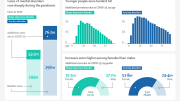
According to research, stricter pandemic policy measures are associated with slightly worse mental health and lower life evaluations.
Research suggests that stricter COVID-19 measures are associated with negative mental health effects and a lower opinion of the government’s pandemic response.
- The mental health of people in countries that tried to control virus transmission was more impacted by COVID-19 than that of people in countries that tried to suppress transmission.
- Physical distancing restrictions were more closely linked to mental health than were closures of schools, workplaces, public transport, cancellations of public events, and restrictions on domestic travel.
- Larger effects of stringency on reduced deaths than those observed on adverse mental health avoid a trade-off between psychological distress and saving lives
- Women in general and women living in households with children saw a higher decline in mental health during lockdowns compared to men of all ages.
Stricter pandemic policy measures — often implemented by countries that tried to control, rather than eliminate COVID-19 — are associated with slightly worse mental health and lower life evaluations. This is according to two new studies reviewing data from 15 countries between April 2020 and June 2021 that have been published in The Lancet Public Health journal.
Mental health impacts associated with lockdowns were worse for women and women living in households with dependent children compared to men. This held true at all ages. At the national level, countries that aimed to eliminate community transmission of COVID-19 within their borders (eliminators) experienced fewer deaths and equivalent or better mental health trends during the pandemic than countries that aimed to control rather than eliminate transmission (mitigators).
Over the course of the pandemic, governments across the globe employed diverse strategies and issued a variety of guidelines to contain the COVID-19 pandemic. However, containment measures were not homogenous; some countries adopted ambitious elimination strategies with zero community transmission targets. Other countries chose to slow down transmission through a mix of intermittent lockdowns, workplace, business, and school closings, social distancing, the wearing of face masks, and the cancellation of public gatherings and public transport.
Eliminator countries like South Korea and Japan implemented early and targeted actions such as international travel restrictions, testing, and contact tracing. This resulted in lower levels of COVID-19 infections and enabled them to opt for more lenient domestic containment strategies. In contrast, mitigator countries such as France and the UK opted for less prohibitive international travel restrictions and aimed to control – rather than eliminate – the virus through strict and lengthy domestic policy measures including physical distancing and stay-at-home requirements.
“Governmental responses to the COVID-19 pandemic have been widely debated. At first sight, it may seem that eliminator countries implemented much harsher strategies than other countries because of their widely reported international travel bans. But, in reality, people within these borders enjoyed more freedom and less restrictive domestic containment measures overall than citizens in mitigator countries,” says Dr. Lara Aknin, Simon Fraser University (Canada), author of the first study.
While the first study indicates that the type and timing of pandemic restriction plays a factor in determining mental health impacts, the second study suggests that these are felt disproportionately by different groups.
Together, the findings strengthen the notion that stricter policy measures may lead to adverse mental health outcomes. They also show that effective policies to contain the pandemic must go hand in hand with strategies and resources to address mental health for the general population and those most at risk.
Degree of strictness and type of containment determine impact on mental health
To assess how variation in COVID-19 policy restrictions affects mental health, the first study combined daily policy stringency data with mental health data captured fortnightly from samples of 15 countries. Countries were grouped based on their response to COVID-19 from April 2020 to June 2021 as either eliminators (Australia, Japan, Singapore, and South Korea) or mitigators (Canada, Denmark, Finland, France, Germany, Italy, Netherlands, Norway, Spain, Sweden, and the UK).
In mitigator countries, there was a stronger link between severe containment policies and lower life evaluation compared to eliminator countries. When looking at individual policies, those leading to a loss in social connection and primarily adopted in mitigator countries (e.g., restrictions on gatherings and stay-at-home requirements) were associated with greater psychological distress and lower life evaluations. On the other hand, policies such as school, workplace, public events, and public transport closures, as well as restrictions on domestic travel, were not linked to mental health. Perhaps surprisingly, the number of consecutive days spent under high or low levels of pandemic restrictions yielded no difference in mental health outcomes.
Stricter policy measures were in general associated with lower opinions of the government’s handling of the pandemic, and therefore, worse mental health. Evaluations of how the government handled the pandemic were more positive in eliminator compared to mitigator countries.
Over time, there was a decline in the negative association between stringency and future mental health, partly due to the effect on reduced deaths. Building on previous research, the authors conclude that the effect of strict policies on reducing deaths is much larger than the one observed for adverse mental health outcomes.
Study author Dr. Rafael Goldszmidt, says, “Our research demonstrates that in addition to the intensity of the pandemic itself, the type of the pandemic response pursued makes a difference to people’s mental health. Mitigation strategies may be associated with worse mental health outcomes at least in part because containment measures such as long periods of lockdowns and physical distancing can impede social connections. Nevertheless, as stricter policies are proven to be effective at reducing deaths, they may help offset the effects they have on psychological distress and life evaluations.”
He adds, “Strategies that aim to eliminate transmission while promoting early actions and targeted stringency can reduce deaths while also protecting people’s mental health in the process. At the same time, governments need to provide clear and consistent information about policy measures to increase residents’ confidence in the government’s handling of the pandemic.”
Among the study’s limitations is that mental health data were not available in the present survey before April 2020, when the pandemic began. Therefore, it was not possible to explore how mental health changed during the early implementation of COVID-19 policies when initial reactions may have differed from later responses. Furthermore, findings are limited to the specific time, policies, sample of countries, and nature of the pandemic studied.
Women’s mental health most impacted by lockdown
The second study, based on nationally-representative data from Australia, underscores that the mental health impacts of lockdown were not felt equally across all demographic groups. The authors exploited a natural experiment that emerged from Victoria’s unique lockdown, while other jurisdictions remained unrestricted, to isolate the causal impact of lockdown. The authors used data from over 20,000 individuals included in the Household, Income, and Labour Dynamics in Australia (HILDA) Survey. They compared the mental health of individuals in the state of Victoria during lockdown (the treatment group) relative to their mental health the year before lockdown and compared this relative change with the relative change of mental health of residents living in the remainder of Australia (the control group) who were relatively free of restrictions.
The analysis revealed that lockdown had a significant, but relatively small, adverse mental health effect. While the experience of lockdown slightly lowered mental health scores across the study population, females were more likely to suffer mental health consequences than males, especially those between 20 and 29 years of age. There were no significant effects for adolescents of either gender and no effects for younger males (aged 20-29). Meanwhile, males aged 55 years and above saw an improvement in their mental health during lockdown – the only demographic group that did so.
Moderately large effects were also found for females living in coupled households with dependent children. They were more likely than any other group to face negative mental health outcomes, while males in coupled households with dependent children and without children only saw modest negative outcomes. No negative effect of lockdown was found for single mothers.
Study author Professor Mark Wooden of the University of Melbourne says, “While the effects of lockdowns on overall population mental health were small, there were substantial and clinically relevant impacts for some groups. Women, especially those living in couple families with dependent children, have been hit hardest and were more likely than men in any age group to see a decline in their mental health. This gendered effect may be due to the additional workload associated with working from home while having to care for and educate their children at the same time, heightening already existing inequalities in household and caring responsibilities.”
Wooden adds, “It may seem unexpected that this trend did not apply to single mothers. One reason for this may be the financial support package Australia’s Federal Government provided this group with as part of its economic recovery response which could have eased concerns and anxiety about lockdowns. In addition, single mothers are more likely to have experienced life without a safety net and strong support system before the pandemic. As such, they may have found it easier to adapt to sudden changes than women in coupled households.”
The researchers acknowledge several limitations to their study. As the data only includes information on the time period during lockdown, no conclusion about the duration or persistence of the mental health lockdown effect can be drawn. Secondly, it is possible that, without the aggressive COVID-19 suppression approach taken by the Australian Government in, the rate of COVID-19 infection would have been higher which could have resulted in greater COVID-19 morbidity and mortality and therefore could have had a much greater impact on population mental health. Finally, consideration needs to be given that the strict lockdown approach and the country-specific nature of the economic, employment, and welfare policy responses to the pandemic are specific to Australia and may not be generalizable to other settings.
References:
“Policy stringency and mental health during the COVID-19 pandemic: a longitudinal analysis of data from 15 countries” by Lara B Aknin, PhD; Bernardo Andretti, MSc; Rafael Goldszmidt, PhD; Prof John F Helliwell, DPhil; Anna Petherick, DPhil; Prof Jan-Emmanuel De Neve, PhD; Prof Elizabeth W Dunn, PhD; Daisy Fancourt, PhD; Prof Elkhonon Goldberg, PhD; Sarah P Jones, BSc; Ozge Karadag, MD; Elie Karam, MD; Prof Richard Layard, FBA; Prof Shekhar Saxena, MD; Emily Thornton, BA; Ashley Whillans, PhD and Jamil Zaki, PhD, 21 April 2022, The Lancet Public Health.
DOI: 10.1016/S2468-2667(22)00060-3
“Effect of lockdown on mental health in Australia: evidence from a natural experiment analysing a longitudinal probability sample survey” by Prof Peter Butterworth, PhD; Prof Stefanie Schurer, PhD; Trong-Anh Trinh, PhD; Esperanza Vera-Toscano, PhD and Prof Mark Wooden, MSc, 21 April 2022, The Lancet Public Health.
DOI: 10.1016/S2468-2667(22)00082-2









When people learn that they are 100% responsible for their mental health and happiness, society will evolve by leaps and bounds.
We are not responsible for our environment, that is mostly our of our control. But we are 100% responsible for how we react.
It’s more the entitled Western white people with the issues with lockdowns. Want all the “rights and freedoms” with utterly zero responsibility. Who invented the “truckers strike”? Canadians. Who invented the Covid denial? Americans.
Pretty sure there were riots in European cities that weren’t just ‘white’ westerners but ‘coloured’ Westerners as well because they equally despised being locked up. Canada and America are no longer the homogeneous countries they were in the 1960’s either and I’m fairly sure I saw ‘people of colour’ in the news that also protested against lockdowns.
You seem to have fallen into a crypto-fascist doctrine and racist doctrine without even realizing it. You are a True Believer, ready to jump onto any populist band wagon.
You have assumed a lot. Mind you, I took liberties as well.
Let me make an assumption, then ask for clarity; You used the term “crypto-fascist”, making me believe you’re under 30, maybe even under 25. Am I right?
No matter, point is whatever culture they were in .ca, .us or .eu, they were totally westernized (white) inside.
Now I will make a challenge to all: Prove me wrong.
I’m American and COVID here is absolutely awful. This nation is so commercialized, people will pitch a fit because a store asked them to wear a mask as the hospitals overflow with elderly people suffocating next door. I wish I lived in new Zealand, and if had a way to move I would. This is pathetic, if there was a coordinated effort to test for COVID early on this might not be happening. The US could’ve done so much better. I’m tired of all the idiocy about COVID. The do nothing response strategy has shown to be a failure, just look at how much worse Sweden’s numbers are than neighboring Norway or Finland. Sweden’s numbers are still tame, even, in comparison to the US
Public health measures have been instituted by governments for hundreds of years, the word quarantine comes from the Italian word for forty, because the city states there would quarantine ships for forty days. Why people act it’s something new or excessive is beyond me.